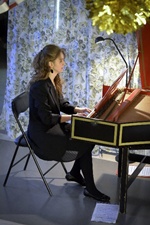> [Archived] Interviews

Interview with the Harpsichordist Cipriana Smărăndescu
Cipriana
Smărăndescu, there’s a new activity of yours, a new event.
This time it is a seminar, followed by a concert, naturally, and a
masterclass. What is it about? What is the content of this activity?
It will be a truly important moment for me, a new experience, because it is the opening of a new office of the European Center for Studies in Music and Acoustics. This day, open to the public, will begin with a presentation of this centre, then there will be a series of conferences on harpsichord. Sergio Cingolani will present the acoustic part of the harpsichord. The man who brings the instrument will be a harpsichord maker, Augusto Bonza, and he will speak about elements of making harpsichords. Andrea Riderelli will talk about a history of this instrument’s repertoire, and finally, I will basically show everything they speak of in a recital with works ranging from the year 1500 to the official end of the harpsichord – 1750, with a composition by Bach.
One very interesting thing is that this centre deals with an academic preparation of sound engineers for the Swiss radio and television company in the Italian part of Switzerland. Those who have graduated from this centre can work as sound engineers for a very important institution afterwards. Thus, the concert will be both a concert open to the public – the emotion will be the one conveyed to the audience – and a practical illustration of what they have learned during the academic year. Basically, general rehearsals will be recorded, the concert will be recorded, too, and this recording will remain as a synthesis of what they have learned and what I played that evening.
It is very important because in this academic centre each instrument is dealt with as a working element; they learn how to record a clarinet, how to record a piano, a harpsichord. They specialise on each instrument. For the harpsichord I had the honour to be chosen for this wonderful experience and I will be very nervous because I will play a superb harpsichord, made by Augusto Bonza. He is, among other things, the one who is in charge of the collection of musical instruments at the Milan museum. On the other hand, there will be a sea of microphones in front of me, recording very precisely everything I do; so this will double by nervousness.
You
won’t be very far from your debut in the artistic career at the
radio, I suppose.
Exactly. This is what makes me feel at home. The fact that I have worked at a radio, the fact that I have made recordings of concerts given as a harpsichordist... The radio makes me know exactly what I have to do. Perhaps I will be the one who will give directions about the recording, about the way the microphones need to be set, because I have managed to get some experience in my work at the radio.
Cipriana
Smărăndescu, thank you and good luck!
Thank you and I hope we’ll meet again with other wonderful news.
Translated by Irina Borțoi and Elena Daniela Radu
MTTLC, The University of Bucharest














